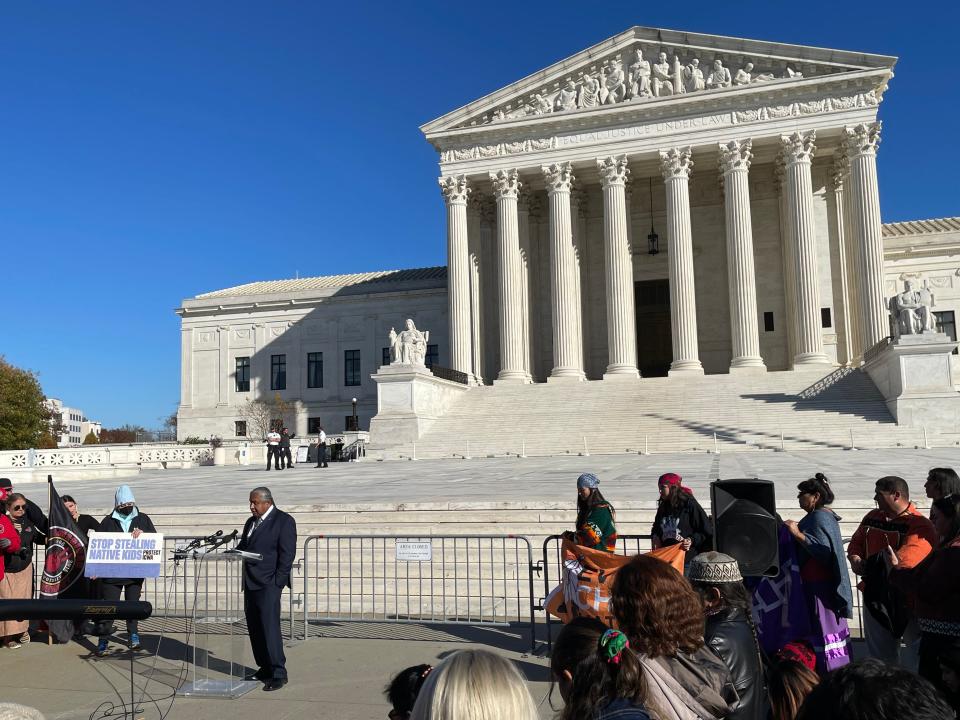Protect Indian communities; keep the Indian Child Welfare Act intact
One decision by the United States Supreme Court this spring could impact the lives of thousands of Native children and tribal sovereignty overall.
The Supreme Court is expected to soon issue a ruling on Brackeen v. Haaland, deciding the fate of the Indian Child Welfare Act, or ICWA, a 40-plus-year law that has kept generations of Native children connected to their families and communities. As the elected leader of the Morongo Band of Mission Indians, I know firsthand how devastating the loss of this law would be for tribal families. ICWA is even part of my own family’s story and is integral to how we came together to keep our children connected to our culture. But aside from traumatizing families, losing ICWA could overturn centuries of congressional authority and constitutional precedent.

The U.S. Congress passed ICWA in 1978, responding to the ongoing crisis of state agencies removing Native children from their homes. It is estimated up to one-third of Native children were removed from their homes and separated from families and tribal communities, even when there were family members willing to take care of them, according to a 1978 federal report citing data from the Association of American Indian Affairs. ICWA was designed to end this traumatic practice.
At its core, ICWA is a common sense law. It ensures that tribes are informed and able to have a voice in ensuring the best outcomes for their communities. ICWA promotes the best interests of children by ensuring state agencies make active efforts to identify and reunite children with family members when a safe home is available, if it is determined they must be removed from the care of biological parents.
The law’s success in prioritizing the needs and safety of children has meant that, for decades, it has been considered the gold standard of child welfare laws by leading children welfare organizations. Those who are impacted by ICWA most are fighting for it – more than 500 tribes, alongside tribal organizations, members of Congress, legal historians, and child welfare experts, among others, filed briefs before the Supreme Court on the critical need to protect ICWA.
Unfortunately, those who are working to overturn ICWA are dangerously close to seeing the Supreme Court grant their wish. If it does, it would be detrimental to not only my tribe but to all Native communities. It would damage child welfare, as tribes would no longer be notified of cases involving their children in need of care nor be part of the process to ensure the best outcome for the child and family. It would mean many of the stories of children successfully unified with identified family members would never have occurred.
If the Supreme Court overturned ICWA in this case, it would be a deathly blow to the core of Indian law. The U.S. Constitution recognizes tribes as sovereign nations, and tribal citizenship is a political classification – one that has been upheld by congressional authority and courts for decades, dating back to America’s founding. Losing ICWA would threaten the very principles that tribal sovereignty was built on.
I am encouraged that Morongo joined our fellow tribes in defending ICWA before the Supreme Court last year, and the strength of our arguments was clear as day. I remain optimistic that the court will choose to rule on the right side of law, the right side of history, and with our children and families. Our children deserve nothing less.
Charles Martin serves as the elected Tribal Chairman for the Morongo Band of Mission Indians in Cabazon, California. Elected in 2021, Chairman Martin works with the Morongo Tribal Council to oversee all aspects of Tribal operations on the 36,000-acre Morongo Indian Reservation, including management of the Morongo Tribal Government and of the Tribe’s diverse business enterprises in gaming, energy, hospitality, recreation, finance, manufacturing and retail. He can be reached at lbroderick@morongo-nsn.gov
This article originally appeared on Palm Springs Desert Sun: Protect Indian communities; keep the Indian Child Welfare Act intact

